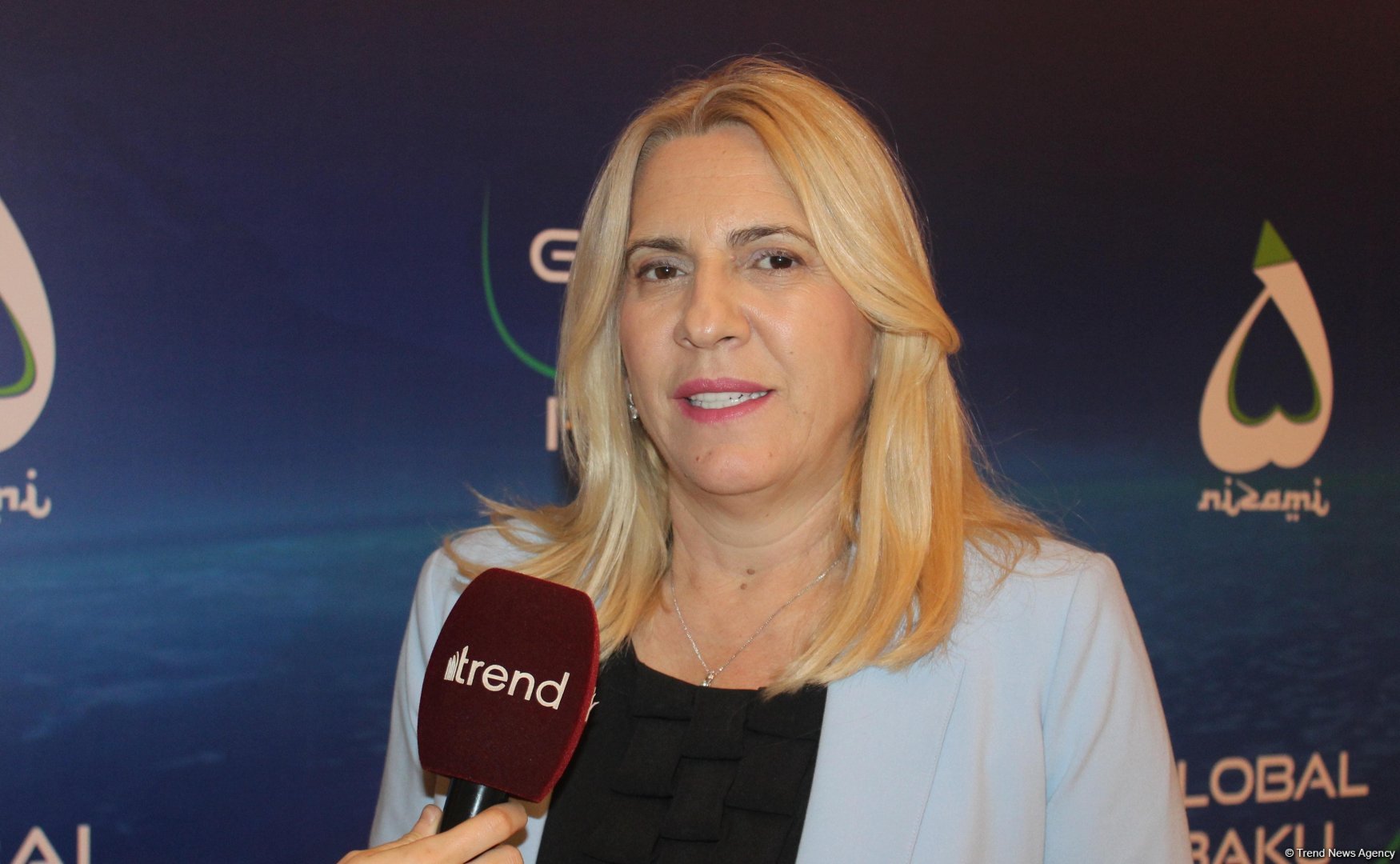BAKU, Azerbaijan, April 3. Bilateral relations between Bosnia and Herzegovina and Azerbaijan have advanced rapidly in recent years, bringing mutual satisfaction to both nations, said Željka Cvijanović, Chairwoman of the Presidency of Bosnia and Herzegovina, in an exclusive interview with Trend.
"I can confidently affirm that our relations are now exceptionally strong and marked by genuine friendship. Above all, we owe our deepest gratitude to President Ilham Aliyev, whose substantial personal contribution has been instrumental in strengthening our institutional ties," Cvijanović stated.
She highlighted a recent meeting in Baku, where both sides discussed enhancing cooperation. Cvijanović also recalled the signing of the Declaration on Strategic Partnership between Bosnia and Herzegovina and Azerbaijan.
"We remain steadfast in our commitment to further solidifying our relations and establishing a comprehensive framework to foster cooperation and business ties across all areas of mutual interest," she noted, expressing confidence that ongoing efforts will lead to further advancements in bilateral cooperation.
Furthermore, she highlighted the strategic advantages that both Bosnia and Herzegovina and Azerbaijan possess due to their geographical locations, emphasizing their potential to drive regional trade growth.
Cvijanović went on to underline the increasing importance of the Middle Corridor, noting that Bosnia and Herzegovina has the potential to become a central distribution hub for goods coming from Azerbaijan, as well as for broader trade flows towards Central and Western Europe.
However, she stressed that achieving this potential requires substantial infrastructure development. "A crucial prerequisite for this is enhanced infrastructure connectivity, including the construction of new and modern transport routes that would facilitate faster and more cost-effective goods transportation through Bosnia and Herzegovina," the chairwoman stated.
She also revealed that her government is actively engaging in discussions with Azerbaijani partners to develop specific projects aimed at improving transport infrastructure. "We are hopeful that the implementation of these projects will take place in the near future," Cvijanović added.
Cvijanović emphasized that both entities of Bosnia and Herzegovina - Republika Srpska and the Federation of Bosnia and Herzegovina - are committed to creating a favorable economic and business environment to draw in new investments.
"We offer numerous advantages to investors, from a highly skilled and cost-competitive workforce by European standards to various incentives and an excellent geographical position," Cvijanović noted. She added that these advantages position Bosnia and Herzegovina as an attractive destination for investment, particularly in sectors like energy, infrastructure, agriculture, tourism, and education.
Cvijanović also identified the energy sector as a significant area of potential development, especially in cooperation with Azerbaijan. She explained, "Energy is one of the most promising industries and has become a crucial pillar of overall development. Azerbaijan, with its abundant natural and energy resources, presents valuable opportunities for collaboration."
She pointed out that Bosnia and Herzegovina, particularly Republika Srpska, possesses substantial untapped natural resources, notably in hydropower and wind energy. "We have significant potential in this sector, and I believe energy can serve as a key point of economic cooperation between our countries," Cvijanović added.
Energy security, she stressed, is an existential challenge worldwide, making the energy sector even more important for both Bosnia and Herzegovina and Azerbaijan. Cvijanović also mentioned that discussions on energy cooperation have been ongoing, with high-level institutional meetings and continued communication at the institutional level.
Željka Cvijanović then highlighted the importance of the Global Baku Forum as a platform for high-level discussions on pressing global challenges and strategies to address them. She noted that the ongoing conflict in Ukraine was a central topic at this year’s forum but emphasized a more optimistic outlook.
Cvijanović also used the forum to draw attention to what she described as a severe crisis in Bosnia and Herzegovina, "the most serious since the signing of the Dayton Peace Agreement". She criticized the actions of the High Representative, Christian Schmidt, stating that his decisions had been imposed unlawfully, bypassing domestic institutions and democratically elected representatives.
She specifically highlighted the indictment and first-instance conviction of Republika Srpska President Milorad Dodik, arguing that he was prosecuted for performing his constitutional duties. "His trial represents a textbook example of lawfare – where the judicial system is weaponized to eliminate political opponents under the guise of upholding justice," she said.
Cvijanović stressed that the leadership of Republika Srpska is engaged in a struggle to uphold the Dayton Agreement and protect its constitutional autonomy. Given the extent of misinformation on the issue, she felt it necessary to provide forum participants with a first-hand account of the situation in Bosnia and Herzegovina.
"This year, we were able to approach it with a slightly greater sense of optimism, as peace initiatives led by President Trump and the new U.S. administration have at least provided a glimpse of light at the end of the tunnel," Cvijanović stated. She added that this optimism extends beyond Ukraine to other regions, including the Middle East and the conflict in Gaza.







